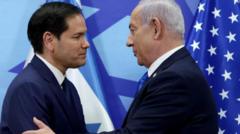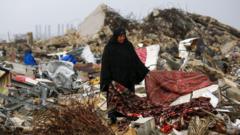The proposal presents challenges for Jordan amid its already complex relationship with Palestinian refugees.
# Trump's Gaza Proposal Raises Concerns for Jordan's Stability

# Trump's Gaza Proposal Raises Concerns for Jordan's Stability
Former President Trump's plan to relocate Gazan Palestinians could strain Jordan's historical ties with displaced groups.
President Trump’s recent proposal to relocate a significant number of Palestinian refugees from Gaza to Jordan has raised concerns about the implications for regional stability. During a meeting with King Abdullah II at the White House, the Jordanian monarch made it clear that such a plan is unacceptable, citing Jordan's delicate history with displaced Palestinians.
The proposal, while still vague, calls for the United States to take control of the Gaza Strip, with neighboring countries like Jordan and Egypt absorbing the Palestinians currently residing there. King Abdullah stressed his commitment to supporting Palestinians in need, particularly in terms of medical assistance, while subtly rebuffing Trump's idea.
Jordan has a complicated relationship with Palestinian refugees, shaped by decades of political and social tensions. Past violence between Jordanian authorities and Palestinian factions has left deep scars, and the influx of additional displaced individuals could exacerbate these issues.
The King’s rejection of Trump's plan underscores not only the historical challenges but also his personal concerns as the ruling monarch overseeing a nation with a substantial Palestinian population. Jordan’s leaders are wary that introducing more refugees could inflame existing pressures, threatening both national stability and the fragile balance in a country where nearly half of the population identifies as of Palestinian descent.
Trump’s proposal, therefore, while aimed at providing a solution for Gaza, could unravel longstanding ties and spark conflict in a region already fraught with tensions. For now, King Abdullah maintains Jordan's position, emphasizing diplomatic dialogue as key to resolving the Palestinian issue rather than unilateral measures.
The proposal, while still vague, calls for the United States to take control of the Gaza Strip, with neighboring countries like Jordan and Egypt absorbing the Palestinians currently residing there. King Abdullah stressed his commitment to supporting Palestinians in need, particularly in terms of medical assistance, while subtly rebuffing Trump's idea.
Jordan has a complicated relationship with Palestinian refugees, shaped by decades of political and social tensions. Past violence between Jordanian authorities and Palestinian factions has left deep scars, and the influx of additional displaced individuals could exacerbate these issues.
The King’s rejection of Trump's plan underscores not only the historical challenges but also his personal concerns as the ruling monarch overseeing a nation with a substantial Palestinian population. Jordan’s leaders are wary that introducing more refugees could inflame existing pressures, threatening both national stability and the fragile balance in a country where nearly half of the population identifies as of Palestinian descent.
Trump’s proposal, therefore, while aimed at providing a solution for Gaza, could unravel longstanding ties and spark conflict in a region already fraught with tensions. For now, King Abdullah maintains Jordan's position, emphasizing diplomatic dialogue as key to resolving the Palestinian issue rather than unilateral measures.




















